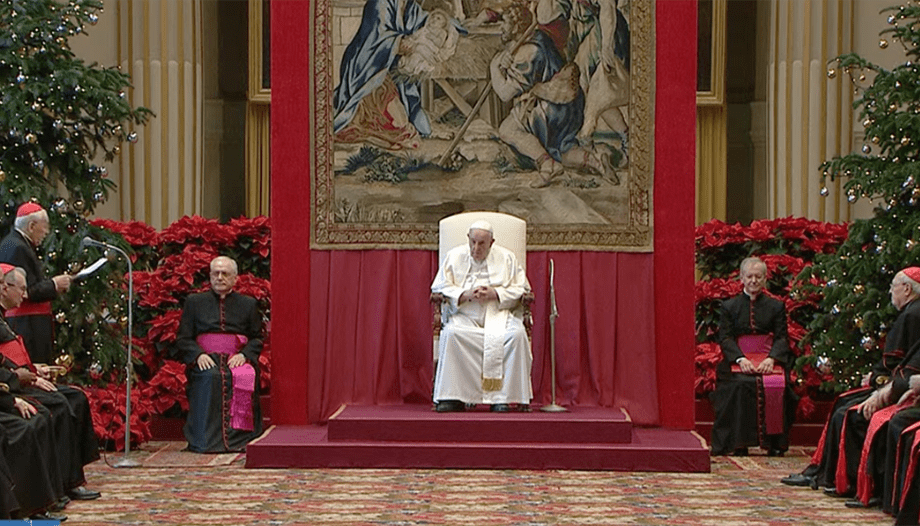For his tenth address to the Roman Curia on the occasion of the exchange of Christmas greetings, Pope Francis chose the practice of a prolonged "examination of conscience", based on a profound attitude of gratitude, to foster a true conversion of hearts and generate feelings of peace in the environment.
Receiving the Cardinals and Superiors of the Roman Curia at the Audience, the Pontiff repeated the practice of parresia, that is, freely saying things that are wrong, but proposing a realistic "solution" to every fall that may arise in the Church, and in particular in the Roman Curia.
Francis spoke first of all of the need to "return to the essentials of one's life," freeing oneself from everything superfluous that impedes a true path of holiness. For this, however, it is important to have "memory of the good" received from God at every step of our life, in order to achieve that inner attitude that leads to gratitude.
The effort consists of making, in all circumstances, a conscious exercise of "all the good we can", overcoming the "spiritual pride" that makes us believe that we have already learned everything or that we are safe and on the right side.
This process is called "conversion" and translates into the "true struggle against evil", succeeding in unmasking even those more insidious temptations, often disguised, that make us "trust too much in ourselves, in our strategies, in our programs". At this point, the Pontiff expressly cited the risk of "fixism" (as if there were no need for a greater understanding of the Gospel) and of the "Pelagian spirit", as well as the heresy of failing to translate the Gospel "in today's languages and ways".
Pope Francis sees the greatest example of this type of conversion in the Church in the Second Vatican Council, the greatest and most recent occasion that gave the attempt to "better understand the Gospel, to make it current, alive and operative in this historical moment". And in this wake is inserted the synodal journey currently underway, because the "understanding of the message of Christ has no end and continually provokes us".
Among the key words used by the Holy Father to stop continually converting is "vigilance" precisely with regard to all those "educated demons" that creep into our days without us realizing it, provoking among other things the delusion of "feeling righteous and despising others." This is where "the daily practice of the examination of conscience" comes into play, Francis suggested, which also allows us to abandon "the temptation to think that we are safe, that we are better, that we no longer need to convert".
And yet, the Pontiff warned, those who are inside the fence, "at the very heart of the ecclesial body," such as those who work in the Roman Curia, are "more in danger than all the others, undermined precisely "by the educated devil."
The Pope addressed a final thought to peace, with reference no doubt to Ukraine and to all the other parts of the world, where in the failure of this tragedy and with respect for those who suffer there "we can only recognize Jesus crucified". But even in this case we must not be naive, because if we are concerned about the culture of peace, we must be aware that "it begins in the heart of each one of us".
This means that even among "people of the Church", and perhaps above all, we must uproot "every root of hatred, of resentment towards our brothers and sisters who live next to us".
"Let everyone begin with himself," Pope Francis added, citing the many types of violence that not only involve weapons or war, but - precisely with curial circles in mind - verbal violence, psychological violence, abuse of power or the hidden violence of gossip: "let us lay down every weapon of any kind."
Finally, the invitation to practice mercy, recognizing that everyone can have limits and that "there is no pure Church for the pure", and to exercise forgiveness, always granting another chance, since "one becomes a saint by trial and error".
The year of the Curia: reform and more laity
Cardinal Giovanni Battista Re, Dean of the College of Cardinals, greeted the Holy Father on behalf of the Roman Curia. Giovanni Battista Re, Dean of the College of Cardinals, greeted the Holy Father on behalf of the members of the Roman Curia. In his greeting, Cardinal Re recalled "the dramatic situation that humanity is going through, not only because of the Covid pandemic, which has not yet ended in the world, but above all because of the tragic wars that continue to cause the shedding of rivers of tears and blood," and referred in particular to the war with Ukraine, which is approaching its first anniversary and in the face of which "His Holiness has continually raised his voice to make it clear that 'with war we are all defeated' and to emphasize that war is madness, useless slaughter, a monstrosity, calling forcefully for the cessation of arms and serious peace negotiations."
As for the Curia, the Dean of the College of Cardinals pointed out that "the year that is coming to an end continues to be marked by the reform promulgated with the Apostolic Constitution Praedicate EvangeliumHe also emphasized "the satisfaction in the Curia for the increase of lay men and women in various important positions of responsibility, which do not presuppose the sacrament of Holy Orders". "This reform" he stressed Re "commits us all to a deeper spirituality, to a greater dedication and a more intense spirit of service, with an intimate sense of responsibility towards the Church and the world and with a more intense fraternity among us".
Cardinal Re also recalled the Holy Father's trips to Canada, Bahrain and Malta, which show his commitment to address "the turbulent problems of society".









